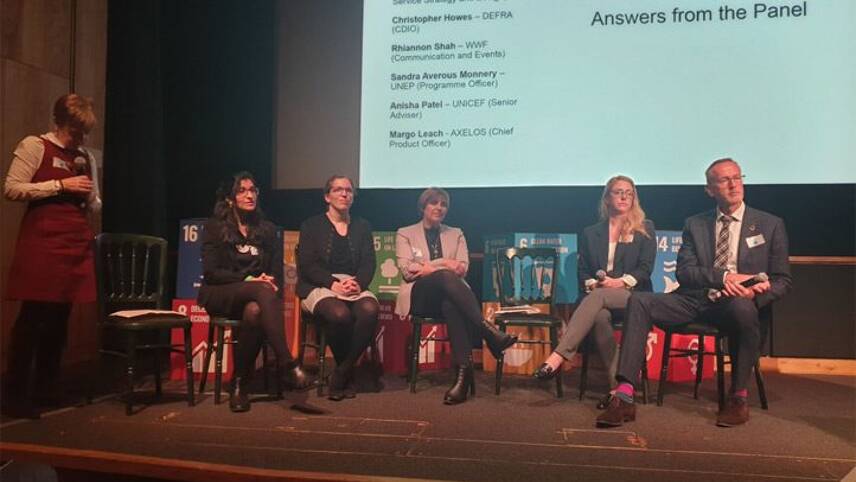Register for free and continue reading
Join our growing army of changemakers and get unlimited access to our premium content

Defra’s chief digital and information officer Christopher Howes (left) with representatives from Unicef UK
Called the Defra e-Sustainability Alliance (DeSA), the coalition consists of 16 organisations which the Government already works with, either in a supplier capacity or as an NGO partner.
This coalition of organisations, which includes the likes of Dell and Capgemini, will be producing regular blogs for Defra, outlining best practice advice on the ways in which IT firms of all sizes can minimise their environmental impacts and how non-IT businesses can use digital technologies to drive progress towards the Sustainable Development Goals (SDGs).
In a first step towards this knowledge sharing, DeSA this week published a guide detailing how businesses can use IT to align their work with the SDGs and the UK Government’s 25-Year Environment Plan. Entitled ‘helping businesses create a greener, more sustainable future through ICT’, the document is intended to support “anyone with an interest in the relationship between sustainability and IT”, regardless of their employers’ size or position in the sector’s value chain.
DeSA’s founding members are AXELOS, the UN’s Environment Programme (UNEP), The Responsible Business Alliance (RBA), Atos, Ark, Xerox, HPE, Capgemini, Dell, IBM, Vodafone, Microsoft, WWF and N2S.
The Alliance was officially launched at a conference at London’s Natural History Museum on Thursday (24 October), during which Defra’s chief digital and information officer Christopher Howes said: “Defra’s mission is to make our land cleaner, our water purer, our landscape greener, our country healthier, and to leave the environment in a better state than we found it.
“When I look at Defra’s vision, I always think that one of the things which doesn’t come out as well as it could is that the organisation is, in a way, unique. It has a role both to protect the environment from people… and to protect people from the environment.
“As we went into a procurement phase with IT a few years ago, we wanted to work with likeminded organisations and to ensure our vision factors into the entire procurement process.
“It has taken a number of steps, including working with the UN Global Compact, to create a strong, coherent and sustainable supply chain.
“The way in which these organisations have worked together – not simply in a one-directional manner with Defra – has enabled them to integrate thoughts and share best practice. We knew we could do more with this and are proud to be in a position where we can share that best practice with others and instigate positive change.
“Today is one of the key points in that journey and it proves what we can achieve when we work together. The challenges we face now – as Defra and globally – are things that single organisations and single countries cannot address on their own.”
Digital: For better or worse?
The growth of the IT sector over the past few decades has been exponential. More than 3.8 billion people globally – 40% of the world population – are believed to use the internet on a daily basis, with eight billion devices expected to be connected to the internet by the start of 2020.
This digital transition has undeniably helped to drive economic, social and environmental progress in a multitude of ways.
But it has also come at a cost to people and planet. According to Capgemini, the global tech sector accounts for 2-3% of man-made CO2 emissions annually – roughly the same proportion as aviation – and, if it were a country, it would be the third-largest electricity consumer in the world. Capgemini’s recent research additionally revealed that $52bn worth of precious metals are wasted annually in e-waste streams, which now stand at around 50 million metric tonnes each year.
The good news is that technology can be decarbonised as a sector in itself, and also help other sectors on their own transitions to a net-zero, resource-efficient and more socially equal world. Defra estimates that digital technologies could reduce global emissions by 15%, if implemented correctly. Google estimates that Artificial Intelligence (AI) could create £167bn of value annually through the circular economy, while PwC believes it could slash global emissions by 4%.
More broadly, Capgemini believes tech can contribute to the delivery of more than 50% of the sub-targets of the SDG agenda, touching all 17 of the Goals.
Sarah George


Please login or Register to leave a comment.